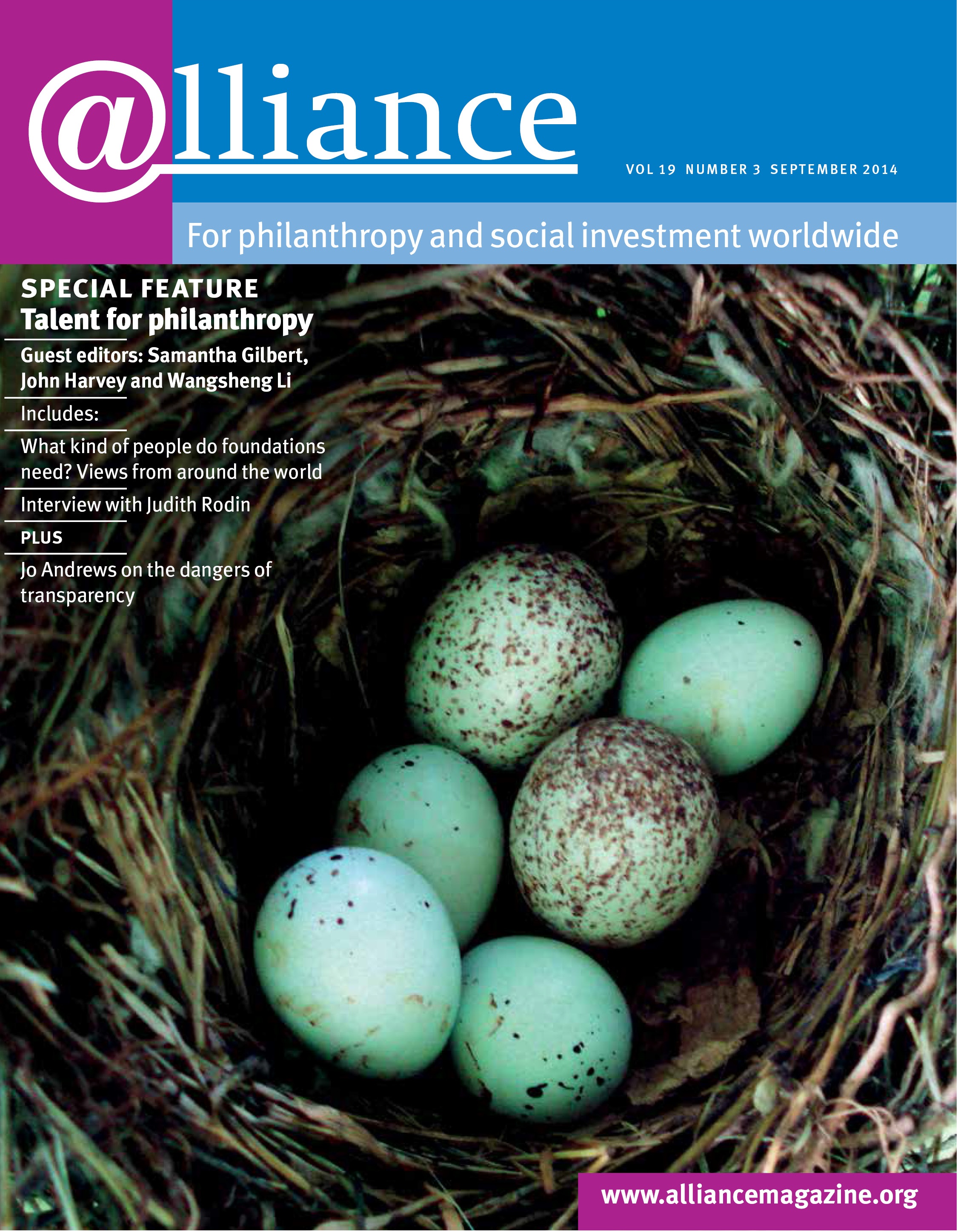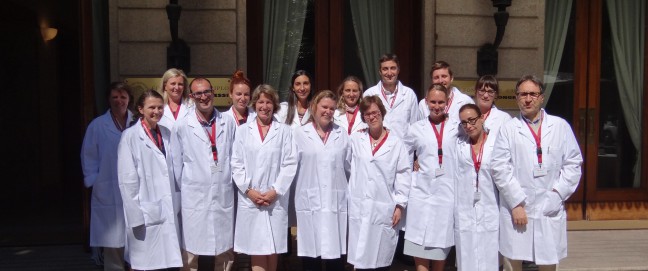Some time ago I did the maths and figured out how many tens of millions of dollars I had given away to good causes over the preceding years. Of course, it was not my money, nor my generosity, and the decisions were not mine alone, but nonetheless I had had a major influence over the direction of many hundreds of significant donations to an almost boundless range of social purposes, all intended to do good. I was also reminded of what my boss, the founder and chair of the foundation of which I was then CEO, was wont to say: that he reckoned half the gifts had actually done good, and the others were wasted – but which half was which he didn’t know! This has always been the basis of my reply to those sceptics who question the need for professional education in grant-making, philanthropy and social investment.
It was also the reason that in 2002 I established, and until recently was director of, the Asia-Pacific Centre for Social Investment and Philanthropy (ACSIP) in the Faculty of Business and Enterprise at Swinburne University in Melbourne, Australia. ACSIP’s first programme was the development of a Master’s in Social Investment and Philanthropy. The short justification I give for the course is to compare social investment to commercial or financial investment. While the former invests funds to make the world a better place, the latter invests to secure a financial return, so the former is certainly as important, and at least as difficult, and possibly more so. Paradoxically, then, while there are probably tens of thousands of university programmes in the business investment field, they are few and far between in social investment.
A mere handful of programmes
While it is true that a search will yield many university-based courses and research centres which have ‘philanthropy’ in their title, the vast majority use that term to refer to fundraising or to the work of the NGO sector rather than grantmaking. While fundraising and grantmaking are in the same general domain of ‘the social economy’, they call on very different skills and accountabilities. Like me, Peter Grant of the Centre for Charitable Giving and Philanthropy in London’s Cass Business School can find only a handful of courses in social investment to list in his book The Business of Grantmaking. Hopefully this will change. Certainly the prospects for the growth of similar programmes in the Asian region and elsewhere would appear considerable.
From my years as a professional grantmaker, it seems clear to me that the skills and responsibilities the profession requires are often more than those needed by financially focused professionals. As well as the obvious – management, investment, budgeting, marketing, human resources, tax and law, governance – there are a host of more subtle areas, including family dynamics, public policy, ethics, fundraising, social research and evaluation, cultural development. To these have been added in recent years impact assessment, social entrepreneurship and logic modelling – all with increasingly global dimensions.
The reasons for scepticism
Why, then, do colleagues consistently express so much scepticism about such programmes?
The misgiving I most readily understand is the pragmatic one. Will such courses be too niche? Will they attract the numbers to make them sustainable and effective? This was my anxiety in launching the Swinburne master’s degree. The viability of our programme was indeed in the balance for some years, but while our numbers remain fewer than we would wish, the university now regards our centre highly for its innovativeness, its relevance to contemporary trends, the exceptional quality of its students, its high level of industry engagement, and the signal it sends to prospective students and our competitors about the business faculty’s recognition of wider social responsibilities.
One of the factors that helps with our numbers, and generates such rich class discussions, is that we reach out to several constituencies, each with a slightly different interest in social investment. Our students include donors (both inheritors and self-made entrepreneurs), corporate personnel, wealth advisers and lawyers, trustees, and foundation and non-profit managers and staff. Interestingly – and for reasons I would be cautious in speculating on – the vast majority of our students are women, at mid-career life stages. Largely absent, for reasons I don’t entirely understand, is a group I believe needs to be captured: younger graduates, yet to determine their ultimate career, but with the affluence and idealism to make a difference in the world.
The dangers of anti-intellectualism
The others reasons given for scepticism frankly disturb me more. Can the required skills be taught? Do they not lodge in the inherent goodness, capacity or purity of motivation of their practitioner? Might they somehow be corrupted in the transition to a programme of instruction?
At best, it seems to me, this view confuses the heart/head distinction which so powerfully underlies a field as complex but also as emotional and value-laden as giving. It also risks a type of preciousness and self-congratulation which I believe besets our field and is the very reason that it should not be protected from the rigours of formal inquiry and learning.
I am Socratic enough to believe strongly in the value of inquiry in precisely those areas where there are no formulas or other ways of determining an answer that is clearly correct. To forgo analysis in favour of feeling can be wastefully and sometimes dangerously anti-intellectual. It is in the dialogue between the two that good decision-making is found. It is also for this reason that students are told, virtually on their first day, that the underlying theme of their studies will be to ‘promote outcomes, not intentions’.
The absence of a requirement for serious education in social investment also sends out a signal that is completely contrary to that which civil society needs. It is too often the case that the priorities of business and government outrank those of the wider community: what more effective way of perpetuating this than exempting those who make funding decisions in this field from the standards expected of their counterparts elsewhere?
Short-changing the profession
This, too, is the reason why the short courses, workshops and the like that are often readily available are not, in my view, an adequate substitute. True, such programmes are often accessible and attractive, and their grounding in practice gives them a claim to real merit. But in a world that believes – hopefully with some justification – that the credentials given by university education are a real indicator of deeper and more rigorous learning, there is no case for short-changing the social investment profession by confining its professional development in this way. It is both the strength and the shortcoming of non-academic programmes that they tend to reflect, rather than challenge, current trends and thinking.
Perhaps this is where the difference between training and education is to be found: training provides answers while education encourages the asking of better questions. Both have their essential place, but in a sector where, as Joel Orosz points out in The Insider’s Guide to Grantmaking,mission statements are hugely ambitious but performance indicators and accountabilities are characteristically open-ended and weak, serious and self-critical scrutiny assumes particular importance.
The Swinburne experience
The course offered at Swinburne, while clearly neither the only or best approach, does suggest the essential elements of an academic programme in the field. It is a Master’s in Social Investment and Philanthropy (there is also a related, broader Graduate Certificate in Social Impact). It begins with an introductory overview, with further units on management, governance and law (including taxation); corporate giving; personal and family giving; evaluation and impact assessment; ethics and public policy; and leadership and emotional intelligence.
It seems that our programmes have much in common with those offered by the Cass Business School. This confirms that there is indeed a core body of thought, scrutiny and knowledge that can become the basis of a systematic teaching programme. Increasingly, too, the inquiries of our students lead to deeper research questions for them or others to pursue through higher degree study or ACSIP’s growing research programme.
Further vindication of the value of a teaching programme in this field is to be found in the extent to which our graduates have transformed the sector in which they work. The traditional pattern in which senior roles managing philanthropic foundations and even trustee companies were given to loyal company secretaries, often as an alternative to retirement rather than because they possessed the right skills, has become increasingly rare as our graduates have moved into many of the key professional roles in the sector.
It is here – in the response of industry to our graduates – that the real confirmation of the value of higher education in social investment is found.
Michael Liffman is senior fellow and founding director at the Asia-Pacific Centre for Social Investment and Philanthropy at Swinburne University of Technology. Email mliffman@swin.edu.au







Comments (0)